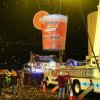New events on hold in Lewes parks
A moratorium is in place on new events in Lewes parks until policies spelling out park rules and regulations are established.
Policies would apply to 1812 Park, Canalfront Park & Marina, George H.P. Smith Park, Mary Vessels Park, Stango Park, Zwaanendael Park and Lewes Beaches.
Lewes Mayor Jim Ford announced what he called a self-imposed moratorium before he and Lewes City Council unanimously approved a fall dragon boat races in Canalfront Park.
Ford said writing park-use policies would be challenging, and he estimated a first draft might be ready in August or September.
Race organizers received the go-ahead at a special May 31 meeting at City Hall to follow-up on unresolved details about the event that came to light at the May 13 monthly council meeting.
Elected officials voiced concerns about the number of people the boat race could draw and the potential damage spectators might cause in the park.
It was the second request to use Canalfront Park, and both requests led to the temporary halt of new events.
In April, a Pennsylvania church asked to use the park for a performance by its children’s choir and an accompanying small orchestra.
The church asked the city to allow a singer to use sound amplification; after lengthy discussion, mayor and city council voted to deny the request.
At the April meeting, Kim Ayvazian, a Pilottown Road homeowner who lives near Canalfront Park, objected to the choir performance and told officials amplified sound travels, invades her home and is disturbing.
City officials told the church the choir and orchestra could come, but they would not be allowed to use amplified sound. Church officials decided to cancel the visit.
Amplification allowed
Elaine Pease, Parks and Recreation Commission chairwoman, said using amplified sound in parks has been permitted at city-approved events, and the city’s existing noise ordinance applies.
Amplified sound has been used at several city-sanctioned events in Canalfront Park that were coordinated through Friends of the Lewes Canalfront Park, the park’s nonprofit fundraising and caretaking organization.
Pease said Summer Concert Series performances in Stango Park use amplified sound and are approved by the city.
Sound amplification is also used in George H.P. Smith Park during Lewes Night Out, a city-approved annual event highlighting law enforcement, fire prevention and public safety.
Pease said the policies developed by mayor and council would come to the park commission for review and comment, and then go back to mayor and city council.
City Councilman Fred Beaufait said until he and his colleagues sit down and begin writing park rules, it’s too soon to say exactly what they might be.
“We need to have a policy so that we’re consistent. I want to make sure we treat everybody equally and not be arbitrary,” Beaufait said in a June 5 interview.
Beaufait, who serves as an ex-officio member of the Parks and Recreation Commission, said Canalfront Park must be protected from possible abuse.
“We’ve got a big investment in the park,” he said.
Whatever policies are developed, Beaufait said, must meet the needs of many people.
“We’ve got to let the park serve the people and still be concerned about those who live nearby. But we can’t have so many restrictions that the park loses its viability and its accessibility to the community,” he said.
Lewes’ noise ordinance applies to parks
The City of Lewes has few rules and regulations specifically for parks. Noise in parks falls under a section of city ordinance that states: “It is hereby declared to be the policy of the city council to prevent any unreasonable, loud, disturbing and unnecessary noise. Noise of such character, intensity and duration as to be detrimental to the life or health of any individual or contrary to the public welfare, especially between the normal sleeping hours of 11 p.m. and 7 a.m., is prohibited.”





















































